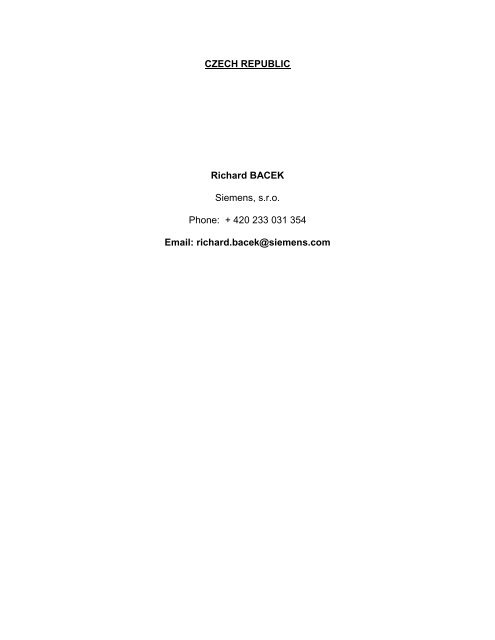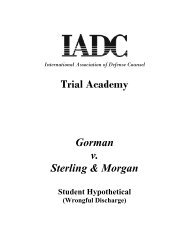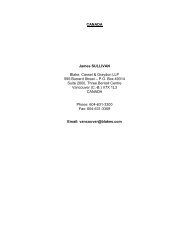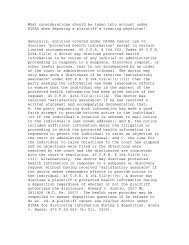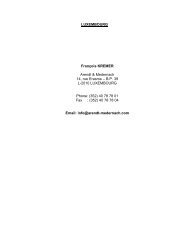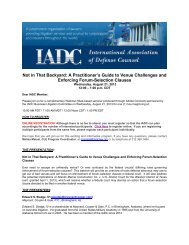CZECH REPUBLIC Richard BACEK Siemens, s.r.o. Phone: + 420 ...
CZECH REPUBLIC Richard BACEK Siemens, s.r.o. Phone: + 420 ...
CZECH REPUBLIC Richard BACEK Siemens, s.r.o. Phone: + 420 ...
Create successful ePaper yourself
Turn your PDF publications into a flip-book with our unique Google optimized e-Paper software.
<strong>CZECH</strong> <strong>REPUBLIC</strong><br />
<strong>Richard</strong> <strong>BACEK</strong><br />
<strong>Siemens</strong>, s.r.o.<br />
<strong>Phone</strong>: + <strong>420</strong> 233 031 354<br />
Email: richard.bacek@siemens.com
1. DEFINITION – PRESENTATION<br />
What attorney-client privilege is and what it is not?<br />
An attorney at law is obliged to maintain confidentiality of all facts learned in relation to<br />
provision of legal services.<br />
An attorney at law is not bound by the confidentiality duty in relation to a person<br />
charged with individual tasks within the provision of legal services if such a person is<br />
bound by the confidentiality duty (e.g. an employee of the attorney at law).<br />
Confidentiality duty survives removal from the list of attorneys at law.<br />
Confidentiality duty to the extent specified in the Advocacy Act (Act No. 85/1996 Coll.),<br />
as amended (the “Act”) applies accordingly to (i) employees of the attorney at law or of<br />
the attorney´s law firm as well as to other persons that are involved, along with the<br />
attorney at law, or the attorney´s law firm, in the provision of legal services, (ii) members<br />
of the Czech Bar Association (the “Bar”) bodies and its employees as well as all<br />
persons participating in disciplinary proceedings, including attorneys at law appointed<br />
by the Chairperson of the Supervisory Board of the Bar to conduct preliminary actions to<br />
verify the occurrence of disciplinary misconduct.<br />
There are certain exemptions from confidentiality duty, e.g. when the attorney at law is a<br />
bankruptcy administrator, he/she has the duty to report money laundering suspicions<br />
etc. to the Bar. The attorney at law cannot rely on his/her confidentiality obligation if the<br />
relevant information (fact) does not relate to the provision of legal services but, for<br />
example, to other business of the attorney at law.<br />
Where the attorney at law is obliged to keep confidentiality, the state authorities and<br />
other persons must respect this and must not force the attorney at law to breach such<br />
confidentiality duty.<br />
2. SOURCES<br />
From which sources is the legal privilege derived?<br />
2.1. Relevant statutes<br />
The attorney-client privilege rules are governed by the Act and subsequent regulations<br />
of the Bar. Certain exemptions are defined in the Anti-Money Laundering Act (Act No.<br />
61/1996 Coll.), as amended. In the field of penal law, the attorney-client privilege rules<br />
are governed, in addition to the above, also by the Penal Procedure Code (Act No.<br />
141/1961 Coll.), as amended.
2.2. Relevant Case Law<br />
For example, decisions of the Constitutional Court Nos.: III. ÚS. 486/98, Pl. ÚS. 29/2000<br />
and II. ÚS. 189/01.<br />
3. SCOPE/LIMITS<br />
Can the attorney-client privilege be waived? If yes, how?<br />
Is the privilege limited? Which documents/information are involved?<br />
The confidentiality duty of an attorney at law may be released only by his/her client, or<br />
after decease of the client, by the client’s legal successor. If the client has more legal<br />
successors, all of them must agree with such release from confidentiality. In case of a<br />
private individual, an interpretation prevails that the term “successor” for this purpose<br />
does not mean the heirs who inherit the descendant’s property, but his/her spouse (or<br />
registered partner) and children, or, if s/he had none, his/her parents (protection of<br />
personality according to Section 15 of the Czech Civil Code – Act No. 40/1964 Coll.).<br />
The release must be expressed in writing and addressed to the attorney at law. In court<br />
proceedings, it is also possible to express such release orally at a hearing. Even after<br />
release from confidentiality, the attorney at law must maintain confidentiality if it is<br />
apparent that the client or his/her legal successor made waiver under pressure or<br />
distress.<br />
The confidentiality duty does not apply to the extent required for the court or other<br />
proceedings if the subject matter of the proceedings is a dispute between the attorney<br />
at law and the client or his/her legal successor; the confidentiality duty also does not<br />
apply in case of proceedings defined in the Act, in complaint proceedings, or a remedy<br />
against a decision of the Bar, as well as in proceedings as specified in the Act, to the<br />
extent necessary for the protection of the rights or interests of the attorney at law<br />
protected by law.<br />
The confidentiality duty of the attorney at law does not affect his/her duties stipulated in<br />
special regulations on administration of taxes and charges; however, the confidentiality<br />
duty still applies in this field with respect to the nature of matters in which the attorney at<br />
law provided legal services.<br />
The confidentiality duty cannot be applied in disciplinary proceedings as well as towards<br />
an attorney at law appointed by the Chairperson of the Supervisory Board of the Bar to<br />
conduct preliminary actions to verify the occurrence of disciplinary misconduct.<br />
In the area of penal law, the confidentiality duty does not affect the legal obligation to<br />
prevent commitment of a criminal offence. Therefore, if an attorney at law realises that a
serious criminal offence (the list of such offences is available in Section 368 of the<br />
Penal Code – Act No. 40/2009 Coll.) is going to be committed, he has to use all his/her<br />
effort to avert and/or to announce the same to the prosecuting attorney or to the Police,<br />
like any other person. However, if the criminal offence has once been committed, an<br />
attorney at law is, in contrast to other persons, released from the notification duty (to the<br />
Police or to the prosecuting attorney) if he/she becomes aware of such fact in<br />
connection with the conduct of his/her profession. Only junior lawyers and clerics of<br />
churches entitled to hear confessions have similar privileges.<br />
A special protection is granted to telephone calls between a person accused of a crime<br />
and that person’s attorney at law. Such calls must never be tapped nor recorded. If a<br />
police officer authorised to exercise wiretaps realises, during a taping session, that the<br />
accused person is talking to his/her attorney at law, he/she must immediately interrupt<br />
the session, destroy all records thereof, and not use the obtained information in any<br />
case.<br />
3.1 Between lawyers<br />
Is correspondence between lawyers protected?<br />
If the correspondence is between attorneys at law and relates to facts learned in relation<br />
to provision of legal services, it would be protected. Other correspondence is not<br />
protected by special rules applicable to attorneys at law, however, protection may be<br />
applicable based on generally applicable legal regulations, e.g. as trade secrecy.<br />
The protection does not relate to correspondence with in-house lawyers.<br />
3.2 Third parties<br />
The correspondence between attorneys at law is protected. The correspondence<br />
between third parties is not protected. It is still questionable (no court decision are<br />
available) whether parts of correspondence between third parties (e.g. between inhouse<br />
counsel and his/her manager) referring to the correspondence with the attorney<br />
at law are protected. However, it is advisable to mark such part of the correspondence<br />
as privileged.<br />
4. IN-HOUSE LAWYERS<br />
Which regulations regarding legal privilege apply to in-house lawyers?<br />
In-house lawyers are not protected by the Act. They are obliged to keep confidentiality<br />
in the extent imposed (and allowed) by general regulations, e.g. the Commercial Code<br />
(with respect to trade secrets) and/or the Labour Code. They may be released from<br />
such duty by their employer.
The extent of such confidentiality duty (right) is significantly weaker than for attorneys at<br />
law. For example, if the in-house lawyer is called as witness in the criminal proceedings,<br />
s/he cannot refuse the statement because of confidentiality duty.<br />
5. PROSPECTIVE<br />
Does professional secrecy tend to be more or less protected?<br />
There is a tradition of protecting professional secrecy in the Czech Republic, however,<br />
with respect to money laundering issues and war against terrorism, the state authorities<br />
attempt to interfere more with the people’s life, including reduction of the scope of<br />
confidentiality. There are cases when state authorities (e.g. the Police) did not comply<br />
with the rules regarding attorney-client privilege, namely during house/office searches.<br />
The Bar protects attorneys at law and protests, usually successfully, against such<br />
breaches of the law, which may cause that the Police cannot use certain evidence<br />
gained in such an illegal manner.


